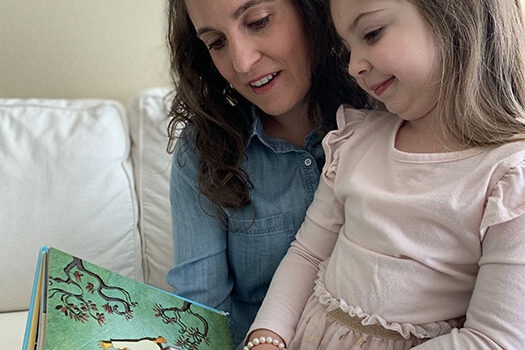“Isn’t it just the best thing ever?!” The kind lady from church asked me when we crossed paths at the grocery store.
I nodded and smiled, looking down at my two-month-old baby in the carrier on my chest.
I can’t remember how I answered her, but I do remember how I felt. I felt awkward and ashamed of my thoughts that followed.
“If this is supposed to be the best thing ever, then why do I feel so sad and afraid all the time?”
“Why do I look forward to naps and bedtimes so I can be alone and feel like ‘me’ again?”
“Why do I just want my life to go back to the way it was?”
I loved my baby. But I didn’t love being a mom. I’m not sure I would have admitted that in those terms at the time. But I felt VERY sad about the reality of the feelings contained in those questions.
I wanted nothing more than to enjoy my new role as a mom. I longed to enjoy snuggling with my baby while she napped instead of leaving her in the bassinet. I would have given anything to trade those feelings of sadness and overwhelm for joy.
My experience as a new mom was nothing like I thought it would be. And that was very disturbing for me.
Maybe It’s Just the “Baby Blues”
Right after I gave birth, I felt anxiety set in immediately. There was an underlying sense of fear and foreboding.
I knew all of the “right answers” and was able to hide what I was going through from almost everyone, except my husband. I was too ashamed to admit the truth.
At one point, around a month postpartum, I mentioned to a trusted friend that I wondered if something was wrong with my mood. She assured me I was probably fine and reminded me that I was still newly postpartum.
In retrospect, I definitely had postpartum depression and anxiety at that point. But I can see how my close friends wouldn’t have known because I wasn’t being honest about the severity of my symptoms. It was too painful to admit at the time.
It was also confusing because I had times when I did feel happy. I had days when I thought I was doing okay. And I’d think that maybe my struggles were just because I was having a hard time transitioning to becoming a mom. I’d never experienced depression before.
So what’s the difference between “baby blues” and what I was experiencing?
“Baby Blues” are a normal period beginning a few days after birth that lasts about 2-3 weeks and goes away on its own. During this time, postpartum hormones are fluctuating and a lot of physical and emotional changes are happening.
It’s normal to feel tearful, sad, or cry about things that usually aren’t a bother. A mom might also feel worried or concerned about how well she’s doing as a mom. There can be extra irritability or crankiness. And she may feel overwhelmed.
These feelings will resolve on their own without treatment. This was not the case for me. My feelings were more pronounced and weren’t improving. If that sounds more like what you’re experiencing, I’ll talk more about depression and anxiety in my next post.
However, if you are still in the first few weeks of postpartum, and the symptoms of “baby blues” sound accurate to your experience, there are ways to navigate this new season and experience.

What’s a Mom to Do While Riding Out “Baby Blues?”
The best thing a mom can do is be gentle with herself.
Lots of changes are happening, and she’s recovering from a major event, both in her body and her family life, while caring for a newborn. Things like sleep deprivation—a common experience after welcoming a baby into your home—are very challenging for everyone involved. Losing sleep, not eating properly, and feeling overwhelmed can add to the already big changes happening in your body and hormones. Be kind to yourself, give yourself patience, and know that nothing is expected of you during this time other than to recover and enjoy your newborn.
The next best thing a mom can do is accept, and even ask, for help.
During this period, we want mom to focus on bonding with her baby and recovering, not doing housework and entertaining visitors. This is a tough subject to navigate in the moment, especially for first-time moms. Having a plan ahead of time for communicating a need for help from supportive family and friends can make a big difference.
For some ideas on how to build this plan (and ask for help!), check out my article, “What I Wish I Knew About Postpartum (Part 2).”

Grace for the Journey
Whether you experience the “baby blues” or something even more intense after giving birth, it’s important to remain open and honest with yourself and those around you. Make a list of a few people before you give birth who you feel safe discussing your emotions with. Talk to them and let them know you may need to lean on them during your postpartum season.
The feelings and things I was struggling with ended up being much more than “baby blues.” Instead of the feelings fading after a few weeks, they continued to get more intense and more difficult to manage over the course of 14 months. I’ll share more about my experience with postpartum depression and anxiety in my next article, as well as steps I took to help aid recovery.
Regardless of your experience, know that there is grace! There is always grace for the journey God has you on—and you are not alone in the process. Rest in the knowledge that He designed you for this role as a mother and He knows exactly what you need for every step of the process.




